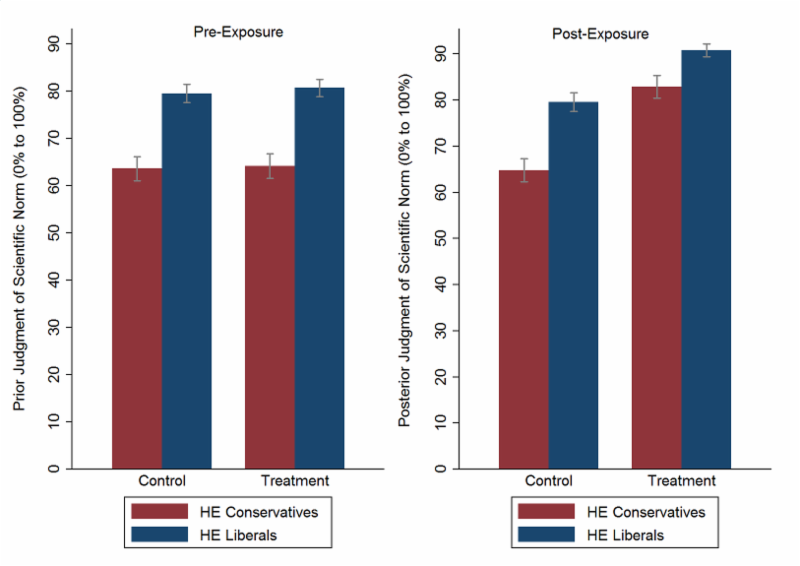|
Today we are pleased to announce the publication of a new article: "Scientific agreement can neutralize the politicization of facts" in the journal
Nature Human Behaviour.
Several recent studies have found that the more education conservatives have, the less likely they are to accept scientific findings about climate change, suggesting a motivated reasoning effect. This has led to the concern that attempts to increase public knowledge might exacerbate political polarization on the issue. Yet, most prior studies have been correlational, which leaves the most important question unanswered: Does communicating climate change facts
cause issue polarization?
We sought to answer this question with a large nationally representative experiment involving 6,301 Americans. Consistent with the motivated reasoning account, before we provided respondents with any information, we found evidence that higher educated conservatives were more likely than higher educated liberals to underestimate the scientific consensus on climate change. However, as part of a randomized experiment, we exposed half of the sample to a simple scientific fact - "97% of climate scientists have concluded that human-caused global warming is happening".
We found that both groups who read the "consensus message," i.e. higher educated liberals and conservatives, adjusted their estimates of the consensus upward in the direction of the actual scientific norm (97%). Moreover, the consensus message reduced polarization between higher educated liberals and conservatives by nearly 50%: the gap between higher educated liberals and conservatives shrank from about 16 percentage points before exposure to the consensus message, to only about 8 percentage points after exposure. These findings are visualized in the figure below:

In other words, we found that communicating a simple fact about the scientific consensus on human-caused climate change did not reinforce political polarization. Quite the opposite: communicating the scientific consensus helped neutralize partisan motivated reasoning and bridge the conservative-liberal divide, at least on this key fact. These findings proved robust across ideology and education levels and build on our prior work illustrating that perceived scientific consensus acts as a "gateway" to other key beliefs about climate change (Ding et al., 2011; van der Linden et al., 2015). Additional graphs, information, and results can be found in the study's Supplementary Information.
The article is available
here to those with a subscription to
Nature Human Behaviour. If you would like to request a copy, please send an email to
[email protected], with the Subject Line: Request Scientific Agreement Paper.
van der Linden, S.
, Leiserowitz, A., & Maibach, E. (2017). Scientific agreement can neutralize politicization of facts. Nature Human Behaviour. doi: 10.1038/s41562-017-0259-2.
|